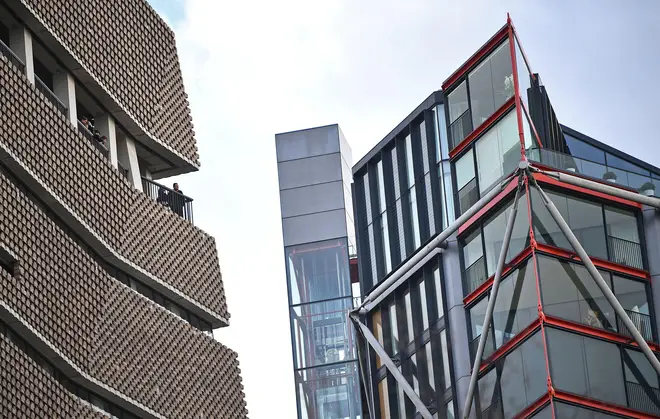
Ian Payne 4am - 7am
1 February 2023, 11:11

The owners of four flats overlooked by the Tate Modern in London have won a Supreme Court battle to stop visitors gawping through their windows "like being on display in a zoo".
Wealthy residents of the Neo Bankside development on the capital's South Bank took legal action against the gallery's board of trustees in a bid to stop "hundreds of thousands of visitors" looking into their homes from the Tate's viewing platform.
They applied for an injunction requiring the gallery to prevent members of the public observing their flats by "cordoning off" parts of the platform or "erecting screening", to stop what they said was a "relentless" invasion of their privacy which allowed 'hundreds of thousands' of museum visitors to look inside their homes - with many even taking photographs.
The five residents lost their case in the High Court and Court of Appeal, taking their case to the UK's highest court in December 2021.
In a ruling on Wednesday, the Supreme Court ruled by a three-to-two majority in the residents' favour.
Giving the court's majority ruling, Lord Leggatt said the lower courts had found that the living areas of the flats - which have floor-to-ceiling windows - were under "constant observation from the Tate's viewing gallery for much of the day, every day of the week".
He continued: "It is not difficult to imagine how oppressive living in such circumstances would feel for any ordinary person - much like being on display in a zoo."
Lord Leggatt found that the Tate Modern's viewing gallery is not a "normal" use of the museum's land and is a legal "nuisance" to the flat owners.
He said: "It is beyond doubt that the viewing and photography which take place from the Tate's building cause a substantial interference with the ordinary use and enjoyment of the claimants' properties.
"Inviting members of the public to look out from a viewing gallery is manifestly a very particular and exceptional use of land. It cannot even be said to be a necessary or ordinary incident of operating an art museum."
In his ruling, with which Lord Reed and Lord Lloyd-Jones agreed, the Supreme Court justice said that a "normal use" of the Tate's building would not allow the flat owners to bring a claim.
However, he added: "The nature and extent of the viewing of the claimants' flats goes far beyond anything that could reasonably be regarded as a necessary or natural consequence of the common and ordinary use and occupation of the Tate's land."
Lord Leggatt said the case will now be returned to the High Court to determine a solution for the flat owners.
The justice said that at the time of the original trial, around half-a-million people visited the viewing gallery - which allows 360 degree views of London - each year.
Dismissing the High Court claim in 2019, Mr Justice Mann suggested the owners could "lower their solar blinds" or "could install privacy film (or) net curtains".
But Lord Leggatt said in Wednesday's ruling: "The claimants cannot be obliged to live behind net curtains or with their blinds drawn all day, every day to protect themselves from the consequences of intrusion caused by the abnormal use which the Tate makes of its land."
Lord Leggatt said that judges at the Court of Appeal had also made legal errors in their decision to dismiss the flat owners' bid for an injunction or damages.
He later said: "I suspect what lies behind the rejection of the courts below is a reluctance to decide that the private rights of a few wealthy property owners should prevent the general public from enjoying an unrestricted view of London and a major national museum from providing public access to such a view."
But Lord Sales, who would have dismissed the flat owners' appeal, said in a dissenting judgment that the High Court judge was correct.
He said: "Looking at the matter generally, a degree of toleration of some annoyance is expected as an aspect of good neighbourliness, with the object of allowing other landowners to enjoy their own rights of enjoyment of their property to the fullest extent reasonably possible."
The justice, who Lord Kitchin agreed with, continued: "Property owners in this part of London have to expect to be overlooked to a significant degree and the risk of people being able to look through their windows from neighbouring properties is an inevitable part of community life in the area.
"It is normal to expect people to use curtains, blinds and other screening measures to limit the annoyance which that might cause."